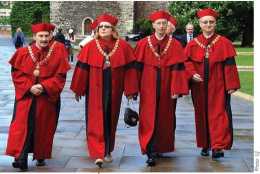7696081951
Higher education
system in Poland

economy;
i master (MA, MSc, magister) and equivalent degrees: Master of Art, MSc. Eng. (Master Engine-er), Master Engineer Architect, qualified physician, dental surgeon or veterinarian - granted following
Polish higher education system allows for both stale and private institutions of higher education. To qu-alify for admission the applicant must hołd the ma-turity certifkate. The detailed rules of admission are determined autonomously by each institution.
Degrees granted to university graduates
At Polish institutions of higher education a three--stage system of Bachelor (Licencjat, Inżynier), Master (Magister) and Doctoral (Doktor) studies has be-en compulsory sińce the 2007/2008 academic year. Aaording to the Higher Education Act of 2005 syt-labuses in all fields of study, except Law, Pharmacy, Psychology, Veterinary Medicine, Medicine, and Dentistry, are prosided on a two-cyde basis. The third cycle, doctoral studies, is open only to those who hołd the academic lilie of Master (magister) or an equivalent title or degree. Doctoral studies last fo-ur years but may be shortened or extended.
Graduates of Polish universities and colleges may obtain the following degrees:
• bachelor (BA, licencjat) - obtained following the completion of 3-3.5 years long college studies;
• bachelor (BSc, inżynier) - obtained following the completion of 3.5-4 years long college studies in technical Sciences, agriculture or the completion of 5-6 years long uniform univer-sity studies. The MSc may also be obtained following the completion of 2-2.5 years long supple-mentary degree studies which may be taken by persons with a college (BA) diploma;
• doctor (PhD, doktor) - a degree awaided to those who pass a doctoral exam and successfully defend their dissertation. To qualify for the academic degree of doctor a candidate must hołd a master or equivalent degree.
The Polish Higher Education System in the European Higher Education Area
Along with other European countries, Poland signed the Botogna Dedaration, which aims at the creation of the European Area of Higher Education. The Fblish Higher Education System funcdons in ac-cordance with the Bologna Piocess prindples.
Institutions of hi$ier education in Poland have im-plemented the ECTS (European Credit Transfer System) commonly applied in Europę. Its goal is to sim-plify procedures of comparing education completed by students in their course of studies.
Fblish institutions of higher education are engaged in the international exchange of students. Programs like SOCRATES/Erasmus, bilateral agreements and individual activities of schools contribute to the de-velopment of contacts between Polish and foreign higher education institutions.
Quality assurance
The Polish Accreditation Committee (Polska Komisja Akredytacyjna, PKA), monitors and Controls educational standards at Polish institutions of higher education, and serves to improve and guarantee quality standaids. The Committee has de-veloped dose co-operation with accreditation com-mittees in other countries. The Polish quality assurance system complies with the ENQA Standards and Guidelines. For morę information,
Recognition of foreign diplomas
The recognition of foreign higher education diplomas in Poland is determined by the Regulation of the Minister of National Education on the Rules and Procedurę for Nostrification of Diplomas and Professional Titles Obtained Abroad (Decem-ber 10,1991). On the webpage of the Bureau for Academic Recognition and International Exchange
Wyszukiwarka
Podobne podstrony:
2015Biuletyn Nabytków CBS Higher education in regional and city development: Wrocław, Poland 2012 /
introduction This study provides basie information on the system of education in Poland, focusing in
ORGANIZERS The State School of Higher Education in Chełm Institute of Mathematics and Computer Scien
THE SYSTEM OF EDUCATION IN POLAND. SCHOOL YEAR 2013/2014 Źródło:
Academy of Business in Dąbrowa GórniczaExecutive Master of Business Administration (MBA)Academy of B
SUBJECT EDUCATIONAL EFFECTS relating to knowledge: knows the rules and read the documentation of the
In comparing the API specs for L-80 and N-80 tubulars, which of the following statements is TRUE? A.
The Bronisław Markiewicz State School of Higher Vocational Education in Jarosławmm55—SS ™SS=
MANDEL, Birgit: Education in culture management offered by schools of higher education - between the
więcej podobnych podstron